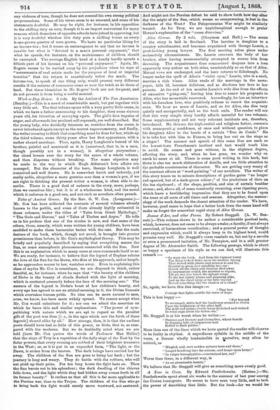Alice Grwme. By 2 vols. (Chapman and HalL) — The
scene of the story is laid in Scotland. The heroine is daughter to a country schoolmaster, and becomes acquainted with George Laurie, a good-looking young lawyer. The first meeting takes place under melancholy circumstances. Mr. Laurie recovers the body of her, brother, after having unsuccessfully attempted to rescue him from drowning. The acquaintance thus commenced deepens into a love apparently very ardent on both sides, unmistakably so on that of Alice. Mutual vows are exchanged, and the hero returns to Edinburgh. No, longer under the spell of Alice's "violet eyes," Laurie, who is a snob, marries a rich vixen. Alice roads of the marriage in the news- paper, falls ill, becomes delirious, and so discloses her love to her parents. At the end of ten months Laurie's wife dies from the effects of excessive "going-out," leaving him free to renew his proposals to, Alice, who has meanwhile recovered. Accordingly, he has an interview with his forsaken love, who positively refuses to renew the acquaint- ance. We hear no more of Laurie, and as for Alice, she dies very quietly and unexpectedly, and so the book ends. The reader will see that this very simple story hardly affords material for two volumes.. Some supplementary and not very relevant incidents are, therefore, introduced. Mr. Grmme, the high-souled and religions father, consents- with unsuspectimg confidence, at once and without question, to place his daughter Alice in the hands of a certain "Due de Conde." He is to take her with him to France, to bring her out on the stage as a singer ! The manner and speech of this same Due are such as the lowest-born Frenchman's instinct and tact would teach him to avoid. He comes and goes without, in the slightest degree, affecting the story, and, when he has gone, we wonder why on earth be came at all. There is some good writing in this book, but there is also too much elaboration of details, and too little attention to- the probable consistencies of character. We are gettiug very weary of the constant efforts at "word-painting" of our novelists. The writer of this story treats us to minute descriptions of garden gates "no longer red-sparred, but of a dark-green colour ;" of the gradations of tints on the inn signboard ; of the shape, position, and size of certain boulder stones ; and, above all, of some constantly recurring, ever ripening pears, which leave a bewildering impression that they are to be found upon the trees at all sorts of odd times and seasons. Altogether, the meteor- ology of the work demands the closest attention of the reader. We have, however, good clause to hope that a better book from the same hand will make 11/3 forget the somewhat vapid story of Alice Grams.






























 Previous page
Previous page